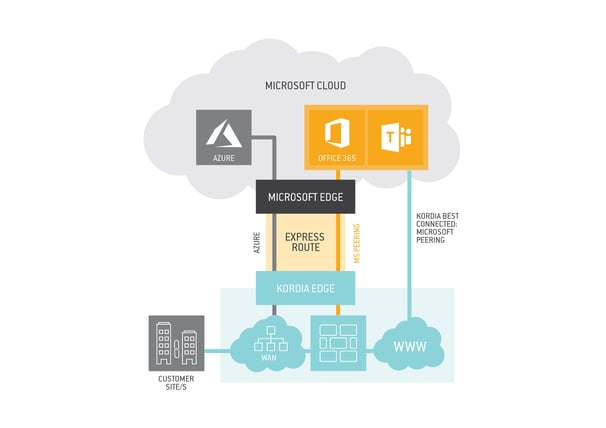If you’re using the Microsoft suite of services, you probably have a good grasp of why direct connections to the Microsoft cloud are beneficial. However, as our team dived into conversations with customers looking to use ExpressRoute, we noticed there’s some misunderstanding around its suitability for accessing Office 365 and Teams.
ExpressRoute lets you extend your on-premises networks into the Microsoft cloud over a private connection. This is facilitated by Kordia, an ExpressRoute Partner with connections in both New Zealand and Australia.
The thing to remember about ExpressRoute is that the connections don’t go over the public internet – these are private connections between Microsoft datacentres and the infrastructure on your premises or in a co-location facility. This means ExpressRoute connections offer more reliability, faster speeds, consistent latencies, and higher security than typical connections over the internet.
When we consider that Office 365 and Teams were developed to be accessed securely and reliably via the internet, we can understand why ExpressRoute isn’t recommended (except for special circumstances). The impact of forcing peer-to-peer and internet traffic down specific routes can have an unpredictable impact on latency, particularly when Microsoft services can be in different global locations.

These subtleties have tripped up a few customers. From my perspective it’s one of the reasons Microsoft launched the Microsoft Azure Peering Service (MAPS), of which Kordia was one of the first global launch partners.
MAPS is a networking service that enhances customer connectivity to Microsoft cloud services accessible via the public internet such as Office 365, Dynamics 365, or Azure. MAPS is engineered specifically to provide the most direct and best performing internet path, optimised for high reliability and minimal latency from Microsoft cloud services to the end-user location. This is why it’s the best choice for Office 365 and Teams traffic.
With the combination of ExpressRoute, MAPS and the standard Microsoft peering offered with Kordia provided internet, all your Microsoft applications are on-net with Kordia. If you are using any services from Azure or any SaaS based application running on Azure to Office 365, Dynamics or Teams, Kordia can ensure you’re best-connected all the way into and across Microsoft cloud.